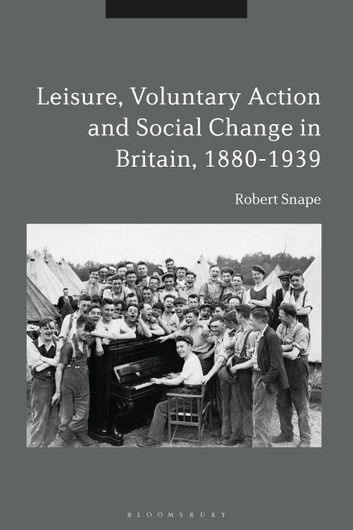| FindBook |
有 1 項符合
Leisure, Voluntary Action and Social Change in Britain, 1880-1939的圖書 |
 |
Leisure, Voluntary Action and Social Change in Britain, 1880-1939 作者:Robert Snape 出版社:Bloomsbury Publishing 出版日期:2018-04-05 語言:英文 |
| 圖書館借閱 |
| 國家圖書館 | 全國圖書書目資訊網 | 國立公共資訊圖書館 | 電子書服務平台 | MetaCat 跨館整合查詢 |
| 臺北市立圖書館 | 新北市立圖書館 | 基隆市公共圖書館 | 桃園市立圖書館 | 新竹縣公共圖書館 |
| 苗栗縣立圖書館 | 臺中市立圖書館 | 彰化縣公共圖書館 | 南投縣文化局 | 雲林縣公共圖書館 |
| 嘉義縣圖書館 | 臺南市立圖書館 | 高雄市立圖書館 | 屏東縣公共圖書館 | 宜蘭縣公共圖書館 |
| 花蓮縣文化局 | 臺東縣文化處 |
|
|
In the final decades of the nineteenth century modernizing interpretations of leisure became of interest to social policy makers and cultural critics, producing a discourse of leisure and voluntarism that flourished until the Second World War. The free time of British citizens was increasingly seen as a sphere of social citizenship and community-building. Through major social thinkers, including William Morris, Thomas Hill Green, Bernard Bosanquet and John Hobson, leisure and voluntarism were theorized in terms of the good society. In post-First World War social reconstruction these writers remained influential as leisure became a field of social service, directed towards a new society and working through voluntary association in civic societies, settlements, new estate community-centres, village halls and church-based communities.
This volume documents the parallel cultural shift from charitable philanthropy to social service and from rational recreation to leisure, teasing out intellectual influences which included social idealism, liberalism and socialism. Leisure, Robert Snape claims, has been a central and under-recognized organizing force in British communities.
Leisure, Voluntary Action and Social Change in Britain, 1880-1939 marks a much needed addition to the historiography of leisure and an antidote to the widely misunderstood implications of leisure to social policy today.
|











